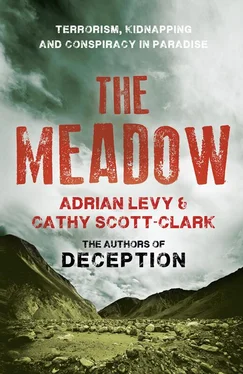Jetlagged and dehydrated, Paul Wells and Cath Moseley arrived at Indira Gandhi International Airport on 16 June. As Jane Schelly and Don Hutchings would nine days later, they fell prey to a tout. This one convinced them that people were rioting in the street near their pre-booked hotel, and that he should take them somewhere safer instead. Panicked and sweating, they agreed, only to find themselves deposited at the entrance to Paharganj, a swamp of squalid backpacker hostels opposite New Delhi railway station.
Lost, Paul and Cath lugged their overstuffed rucksacks past dusty roadside stalls displaying joss sticks, scarves and fake silver. Eventually they found the hotel the taxi driver had recommended, a tumbledown establishment where a handful of teenage boys lay snoring on the floor behind the reception desk. Paul and Cath gingerly stepped over them, trying to block out the pungent smells, and headed for their room.
Over the next couple of days, as they acclimatised to the heat and the lack of sanitation, they tried to make the best of it, buying homespun Indian kurtas and quizzing young travellers over banana pancakes and coffee laced with condensed milk about routes to Ladakh. The owner of their hotel turned out to be a Kashmiri, and offered to book their onward trip for a small commission. They opted for the bus to Srinagar, a journey that would involve travelling north across the New Delhi plains and into the Punjab, before striking north-west to Jammu and the Pir Panjal mountains, taking them, according to their map, alarmingly near to fractious Pakistan. As they left, the hotel owner pressed a handful of his relatives’ business cards into their hands, ‘Just in case you want to stay in Kashmir.’
John Childs was heading towards the Meadow too, although he did not know it yet. By the time Jane Schelly and Don Hutchings, Keith and Julie Mangan, Paul Wells and Cath Moseley had arrived in New Delhi, the forty-two-year-old chemical engineer from Simsbury, Connecticut, had already been in India several weeks, although his experience of the subcontinent could hardly have been more different from theirs. Childs, an introvert and a deep thinker, a wiry figure whose hangdog expression belied his quick wits and dry humour, was not joining any hippy trail. When he wasn’t in his running gear he was happiest in a suit and tie addressing executives in New England boardrooms. He worked for an American weapons manufacturer, Ensign Bickford, and had come to India to tour explosives plants in and around West Bengal. His schedule had been put under the microscope and mulled over for many months – nothing he did was unconsidered, and all too often he tended to see the worst in everything. But then, he was the kind of man who had learned to celebrate his own fatalism. He had worried about this journey for several months, but in the end he had decided to go for it. It would be his first foreign trip for the firm he had joined the previous February, and he hoped that at worst, even if he was struck down with dysentery, it would take his mind off the messy divorce that he feared was going to put a distance between him and his much-loved daughters, Cathy, six, and Mary, five. There was another upside to the visit. After the work was done, he hoped to get in some trekking on the company’s account. And as John was a self-confessed ‘cheapskate’, born watching the nickels and dimes, this was a boon. ‘I never go anywhere without someone else paying,’ he liked to say.
However, from the moment he landed in Calcutta, John, who had grown up surrounded by suburbia on Long Island, New York, the second son of churchgoing Joseph and Helen Childs, found the teeming subcontinent oppressive. India was a chaotic mix of vinegary odours. He couldn’t eat the food. He felt as if he could bench-press the humidity, it weighed so heavily on him. Not widely travelled, he was overwhelmed by the surface details that the locals did not seem to notice, the ‘noise and filth’, as he put it. He also found it more difficult than he had expected to communicate with his Indian counterparts, even though they were all supposedly ‘talking the same language’, and he knew in an instant that he had nothing in common with the Western travellers who milled around the Saddar Street backpacker area, close to his five-star hotel. John had gone straight from school to college, and then into his first job. He couldn’t see the point of putting off the inevitable by travelling aimlessly around the globe. He was always uneasy around people like that.
After Calcutta, John’s colleagues had driven him several hours into the industrial heartland of Bihar, a state that even Indians call the Wild West because of its reputation for corruption and chicanery. He was appalled by the grime-cloaked factories, staffed by hordes of impoverished workers who toiled in atrocious conditions: ‘Coming from the land of the free, I could not take in how people could live and work like that.’ His final work destination was Gomia, a town in southern Bihar where an enormous explosives factory was operated by the British chemical giant ICI. The plan was that he would work there with local managers and technical staff on improving the quality of the explosive materials they supplied to Ensign Bickford.
By the end of June, John’s work was done, and as he had planned, he had a week in hand. Back home in Simsbury he was an endurance athlete, proud of the fact that he ran four or five miles around the local school track every day. He climbed and skied too. Doing business just down the road from the greatest mountain range on earth – he had seen the Himalayas on the flight over to Calcutta and been staggered by their jagged heights – had been one of the reasons he had agreed to make this trip.
But where in the Himalayas should he go? He had thought about doing part of Nepal’s challenging Annapurna Circuit, the mountain trek Jane and Don had completed in 1988, and there were regular flight connections between Calcutta and Kathmandu. But then he came across the adverse weather reports, just as Jane and Don had: ‘When I set about looking into it, I realised pretty quickly it was the wrong time of year for Nepal. The monsoon ruled this option out.’ The ‘real treat’ of seeing Everest was now out of the question, but running his finger along the range to the west he could see other options: ‘All the guides said the same thing. June and July was the best time of year to visit Kashmir.’ Wherever he ended up would be an adventure, he thought, as he zeroed in on the trekking routes in the Kashmir Valley.
Was it safe? John was no authority on the region, but even he knew that Kashmir was troubled by a simmering war he was ‘vaguely aware of’ from the occasional news report. However, the descriptions and photographs he studied of the treks around Pahalgam, to the south-west of the summer capital, Srinagar, were inviting. Was it possible to reach the mountains without being caught up in the state’s insurgency? He was still feeling fragile as a result of the divorce, and he had two confused young daughters back home, about whom he had worried constantly since arriving in India. The last thing he needed was to screw things up by getting himself in a tight spot on the other side of the world. He rang his mother, who was still his main confidante, in Salem in upstate New York. ‘Check things out with the locals,’ she said. ‘They’ll know what is and isn’t safe.’
John sounded out several of his Indian colleagues at the Gomia plant. ‘Half of them jumped straight in. They said I was crazy. They said there was a war going on. Didn’t I know? There had been some kind of kidnapping involving Westerners the previous summer too. But the other half said it was fine to go, and the 1994 incident had been quickly resolved with no one hurt.’ Like every other discussion he had had since arriving in India, this one quickly dissolved into a confusing roundabout of conflicting arguments, with everyone talking over each other.
Читать дальше











